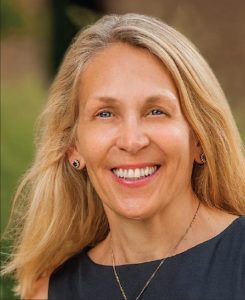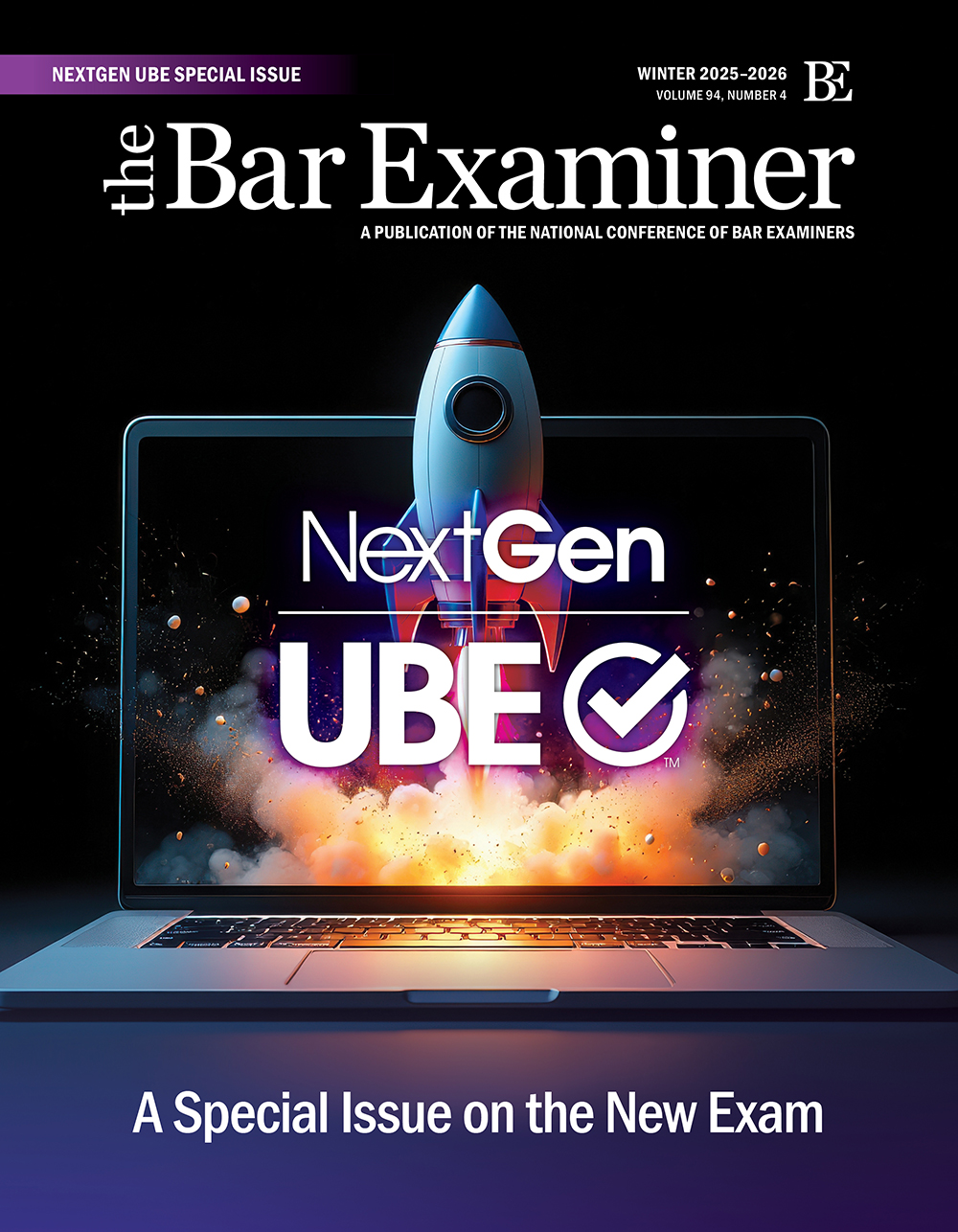This article originally appeared in The Bar Examiner print edition, Summer 2018 (Vol. 87, No. 2), pp 3–5.
By Judith A. Gundersen Greetings from Madison on a beautiful summer day. We are wrapping up a very busy and productive meetings season. In April, we held our successful Annual Bar Admissions Conference in Philadelphia, where we hosted over 350 bar examiners, state Supreme Court justices, and bar admissions staff members. There were over 90 first-time attendees, always an encouraging sign for the future of bar admissions and the membership of NCBE committees, as these individuals bring expertise from a wide variety of backgrounds to lend new energy and ideas to the bar admissions process.
Greetings from Madison on a beautiful summer day. We are wrapping up a very busy and productive meetings season. In April, we held our successful Annual Bar Admissions Conference in Philadelphia, where we hosted over 350 bar examiners, state Supreme Court justices, and bar admissions staff members. There were over 90 first-time attendees, always an encouraging sign for the future of bar admissions and the membership of NCBE committees, as these individuals bring expertise from a wide variety of backgrounds to lend new energy and ideas to the bar admissions process.
A sincere thank-you to our engaged and dedicated Education Committee members; to our Education Committee chair and NCBE Board member Tim Wong of Minnesota; and to all the polished, thoughtful, and thought-provoking speakers at the Annual Conference. And an even bigger thank-you to the NCBE staff members who oversaw every aspect of the Conference, from programming to Conference site logistics to tech support. Most of the credit goes to Laurie Lutz, our Meetings Manager, and Ellen Embertson-Merrill, our Educational Programming Coordinator. As I write this column, we are already planning the next Conference, to be held in San Francisco in May 2019.
We are also wrapping up all our spring drafting committee meetings (a total of 10 meetings) and the two final policy committee meetings of our fiscal year. In addition, we recently hosted an MPRE Question-Writing Workshop with over 20 professional responsibility experts from all over the country. These experts were instructed on drafting high-quality multiple-choice questions by Professor Tim Davis of Wake Forest University School of Law along with five of our MPRE Drafting Committee members. We held this workshop to scale up MPRE question development as we move toward administering the MPRE via computer at test centers across the country. While this exam will still be event-based (three testing windows per year), we will need more MPRE questions, because there will be additional testing sessions offered for each testing window, not just the one session that is currently offered. This workshop was an important step in the transition to computer-based testing for the MPRE. We will provide updates on the transition through 2019 and into 2020 when the transition is complete.
A big part of NCBE’s mission is to educate all our stakeholders about emerging trends and issues that may come their way—and, if those trends have already arrived, then to provide a forum to discuss them and offer strategies and policies for addressing them.
In addition to attending NCBE’s own meetings, NCBE representatives and I have attended several meetings and conferences sponsored by other stakeholders in legal education, admissions, and employment. Issues that are drawing the attention of bar examiners, Courts, and the legal academy are standard setting, lawyer wellness, student debt, paraprofessional or multitiered legal licensure, access to the profession and access to justice, changing accreditation standards, shifting legal employment trends, and, of course, the bar exam itself, both in its current state and what it might look like in the future.
NCBE’s Board members, volunteer committee members, and staff are tuned in to these issues and how they affect the jurisdiction boards, Courts, and bar associations that are charged with the responsibility of lawyer licensing. A big part of NCBE’s mission is to educate all our stakeholders about emerging trends and issues that may come their way—and, if those trends have already arrived, then to provide a forum to discuss them and offer strategies and policies for addressing them. Our 2018 Annual Conference programming included segments on all these issues. The Bar Examiner also provides a forum for in-depth discussion of these issues. In this issue, for example, we are prominently featuring lawyer wellness. The Council of Bar Admission Administrators (CBAA) also plays an important role in providing programming and support for those involved in bar admissions, as evidenced by their members’ participation in the programming at our Annual Conference (and also at their own CBAA conference each fall).
With regard to the bar exam of the future, NCBE is taking the lead on studying the competencies needed for entry-level practice in the 21st century with the creation of our Testing Task Force (TTF). While the TTF has been constituted for only about six months, the progress already made in identifying a research plan, and in choosing a consultant to assist the TTF as it moves forward with its research, is proceeding with due dispatch. A new, regular feature of the Bar Examiner will be updates from the TTF’s work as our comprehensive study progresses. You can catch more frequent TTF updates via the task force’s dedicated website, www.testingtaskforce.org.
If you read Justice Rebecca White Berch’s column in the Spring 2018 issue of the Bar Examiner, you’ll also know that we are working to educate the public and stakeholders about the development and scoring of the bar exam and its fundamental purpose—to protect the public. We think that education and debate about the bar exam is good for all of us in admissions. I was honored to have been invited to present at the Summit on the Future of Legal Education and Entry to the Profession at Florida International University College of Law in April, where legal education and admissions were the topics of debate. I appeared on a panel with Diane Bosse, chair of the New York Board of Law Examiners, to give NCBE’s and a bar examiner’s perspective on the bar exam. (Live streaming of the summit was available, and I heard from some of you that you streamed it.) As a part of our mission to educate the public and other stakeholders about the bar exam, NCBE volunteers and senior staff are working to forge relationships with other admissions and legal education entities that we think will be beneficial to all of us to guide the debate with facts and ground it in sound measurement principles befitting a licensing exam.
On the Uniform Bar Exam front, we have welcomed three more jurisdictions to the growing list of (33) UBE jurisdictions, beginning with Tennessee in April and followed by Rhode Island and Illinois in early June. Tennessee and Rhode Island will begin administering the UBE in February 2019, and Illinois in July 2019. We are very excited that the boards and Courts in these three jurisdictions gave the approval to move forward with the UBE and know that it will be a smooth transition to the UBE. Over 10,000 bar exam scores transferred so far! See this issue’s Facts & Figures for a visual display of these exciting UBE developments.
I’d like to close by thanking NCBE Board of Trustees Chair Rebecca Berch for her leadership, good counsel, the steady hand, and friendship during this transition year as I settled into my role as NCBE president. I can’t think of a better person to have been at the helm of our Board of Trustees than Rebecca, who brings to the Board table a wealth of experience as a regulator, bar examiner, policy maker, innovator, and legal educator. (Yes, she’s worn a lot of hats!) She has one more year on our Board after handing the gavel over in August to Michele (Missy) Gavagni of Florida, who will take over as NCBE chair. I have known Missy for 18 years. She has a wealth of knowledge about admissions. I am also grateful to our entire Board of Trustees for their support and the experience that they bring to NCBE. Rotating off our Board is Bobby Chong of Hawaii; Bobby also steered NCBE through this period of transition and did so with kindness, grace, and thoughtfulness. Mahalo to Bobby.
Until the next issue,

Judith A. Gundersen
Contact us to request a pdf file of the original article as it appeared in the print edition.







